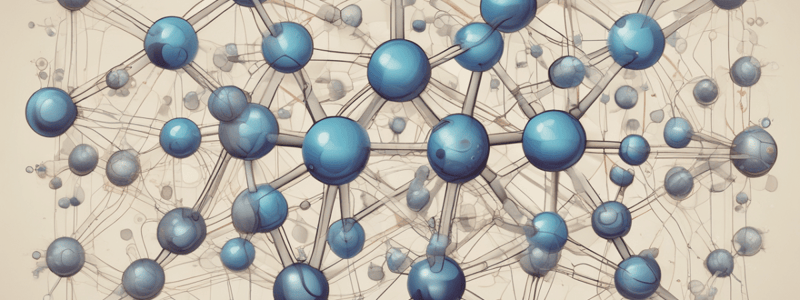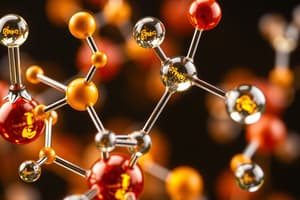Podcast
Questions and Answers
What is the main focus of biochemistry?
What is the main focus of biochemistry?
- Study of carbon-containing compounds
- Study of the physical properties and behavior of molecules
- Study of chemical processes and substances within living organisms (correct)
- Study of non-carbon-containing compounds
What type of bond is formed by the head-on overlap of atomic orbitals?
What type of bond is formed by the head-on overlap of atomic orbitals?
- Ionic Bond
- Sigma (σ) Bond (correct)
- Hydrogen Bond
- Pi (π) Bond
What is the term for the process by which a catalyst increases the rate of a chemical reaction?
What is the term for the process by which a catalyst increases the rate of a chemical reaction?
- Reaction Mechanism
- Chemical Reaction
- Catalysis (correct)
- Solubility
Flashcards are hidden until you start studying
Study Notes
Molecular Chemistry
Molecular chemistry is the study of the structure, properties, and reactions of molecules.
Branches of Molecular Chemistry
- Organic Chemistry: deals with the study of carbon-containing compounds and their properties.
- Inorganic Chemistry: deals with the study of non-carbon-containing compounds and their properties.
- Physical Chemistry: deals with the study of the physical properties and behavior of molecules.
- Biochemistry: deals with the study of the chemical processes and substances that occur within living organisms.
Molecular Structure
- Atomic Orbitals: the regions around an atom where an electron is likely to be found.
- Hybrid Orbitals: the mixing of atomic orbitals to form new orbitals that are suitable for bonding.
- Sigma (σ) Bonds: bonds formed by the head-on overlap of atomic orbitals.
- Pi (π) Bonds: bonds formed by the side-by-side overlap of atomic orbitals.
Molecular Bonding
- Covalent Bonds: bonds formed by the sharing of electrons between atoms.
- Ionic Bonds: bonds formed by the transfer of electrons between atoms.
- Polar Covalent Bonds: bonds formed by the unequal sharing of electrons between atoms.
- Hydrogen Bonds: weak bonds formed between atoms with a hydrogen atom bonded to a highly electronegative atom.
Molecular Properties
- Polarity: the distribution of electric charge within a molecule.
- Molecular Shape: the three-dimensional arrangement of atoms in a molecule.
- Molecular Polarity: the overall polarity of a molecule.
- Solubility: the ability of a substance to dissolve in a solvent.
Molecular Reactions
- Chemical Reactions: processes that involve the transformation of one or more substances into new substances.
- Reaction Mechanisms: the step-by-step process by which a chemical reaction occurs.
- Catalysis: the process by which a catalyst increases the rate of a chemical reaction.
- Equilibrium: the state in which the rates of forward and reverse reactions are equal.
Molecular Chemistry
- Molecular chemistry is the study of the structure, properties, and reactions of molecules.
Branches of Molecular Chemistry
- Organic chemistry studies carbon-containing compounds and their properties.
- Inorganic chemistry studies non-carbon-containing compounds and their properties.
- Physical chemistry studies the physical properties and behavior of molecules.
- Biochemistry studies the chemical processes and substances that occur within living organisms.
Molecular Structure
- Atomic orbitals are regions around an atom where an electron is likely to be found.
- Hybrid orbitals are formed by mixing atomic orbitals to create new orbitals suitable for bonding.
- Sigma (σ) bonds are formed by head-on overlap of atomic orbitals.
- Pi (π) bonds are formed by side-by-side overlap of atomic orbitals.
Molecular Bonding
- Covalent bonds are formed by sharing electrons between atoms.
- Ionic bonds are formed by transferring electrons between atoms.
- Polar covalent bonds are formed by unequal sharing of electrons between atoms.
- Hydrogen bonds are weak bonds formed between atoms with a hydrogen atom bonded to a highly electronegative atom.
Molecular Properties
- Polarity is the distribution of electric charge within a molecule.
- Molecular shape is the three-dimensional arrangement of atoms in a molecule.
- Molecular polarity is the overall polarity of a molecule.
- Solubility is the ability of a substance to dissolve in a solvent.
Molecular Reactions
- Chemical reactions are processes that involve transforming one or more substances into new substances.
- Reaction mechanisms are the step-by-step processes by which chemical reactions occur.
- Catalysis is the process by which a catalyst increases the rate of a chemical reaction.
- Equilibrium is the state in which the rates of forward and reverse reactions are equal.
Studying That Suits You
Use AI to generate personalized quizzes and flashcards to suit your learning preferences.




